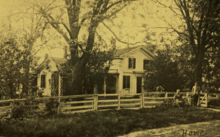Emma Rood Tuttle
Emma Rood Tuttle (July 21, 1839 – June 4, 1916) was an American author and lecturer engaged in educational and reform work.
[4] Emma Rood was born in Braceville Township, Ohio, July 21, 1839, on the farm where her mother, Jane A.
[6] Tuttle was educated in the Western Reserve University, Farmington, Ohio, and in Hiram College, of which institution, President James A. Garfield was then the head.
[5] Her early writings for The Universe of Cleveland, Ohio showed a literary promise that was borne out by her later work as an author.
[8] Among the poems which attracted notice were: "Budding Rose", "Incidents of Life under the Blue Laws", "Parson Smith's Prophesy", "From the Highlands of Heaven", "The City of Sorrow", "Soliloquy of Fulvia at Sicyon", and "The Holy Maid of Kent".
The music included "The Unseen City", "My Lost Darling", "Beautiful Claribel", "One more River to Cross", and "Emma Clair".
Some of the pieces included were "My Ethel isn't in it", "Advanced", "My Agnosticism", "Heartbreak Hill", "Adah isaacs Menken", and "The exit of Ingersoll".
Her lyric compositions were set to music by various composers, among whom were James G. Clark, of New York; Professor Baily, of Michigan; Felix Schilling, of Philadelphia; H. M. Higgins, E. T. Blackmer, Emily B. Talmage, of Chicago; and Dr. E. L. Perry, of Milan, Ohio.
It was then that she wrote and was chief editor of, The Lyceum Guide (Tuttle Publishing Company, 1870),[6] a textbook for Freethought Sunday schools.
Described as a manual of physical, intellectual, and spiritual culture, it contained a collection of music and songs, gold chain recitations, memory works, choral responses, funeral services, programs for sessions, parliamentary rules, instructions for organizing and conducting lyceums, instructions in physical culture, calisthenics and marching, as well as banners and stands for the Bands of Mercy.
The other selections were from other writers, such as Eugene Sue, Constance Fenimore Woolson, Sam W. Foss, Eben E. Rexford, Abby Judson and Hudson Tuttle.
Several pages were given in preface, explanatory of the best methods of conducting these prize-contest exhibitions, and the proper arrangement of hand bills and posters by which to advertise these events.
[3] Emma Rood Tuttle died at her home at Walnut Grove Farm, Berlin Heights, Ohio, June 4, 1916,[3] caused by pneumonia and heart disease.




